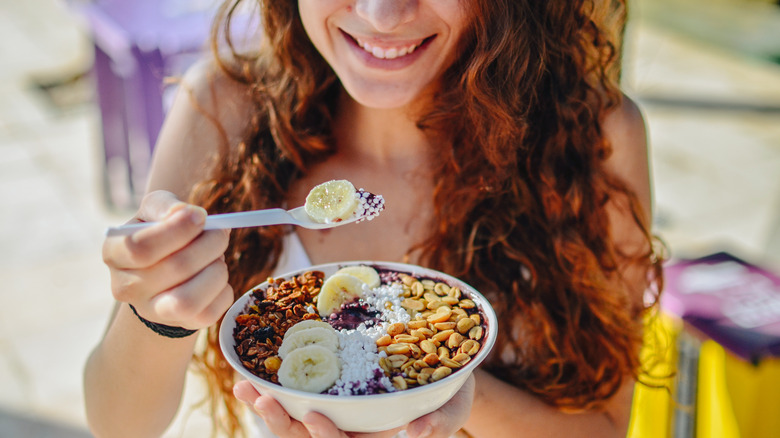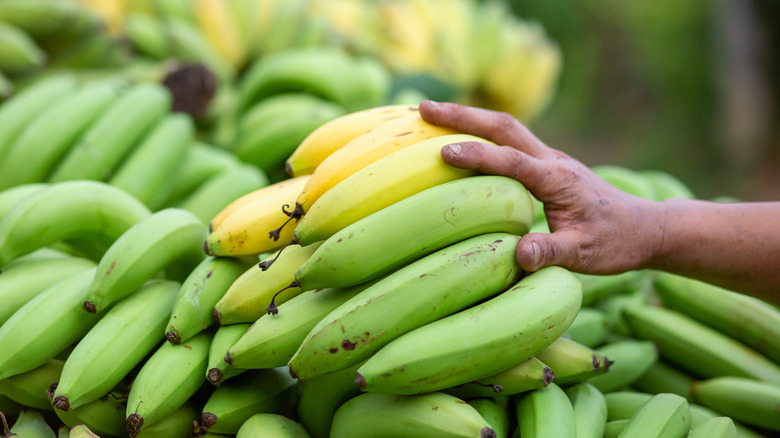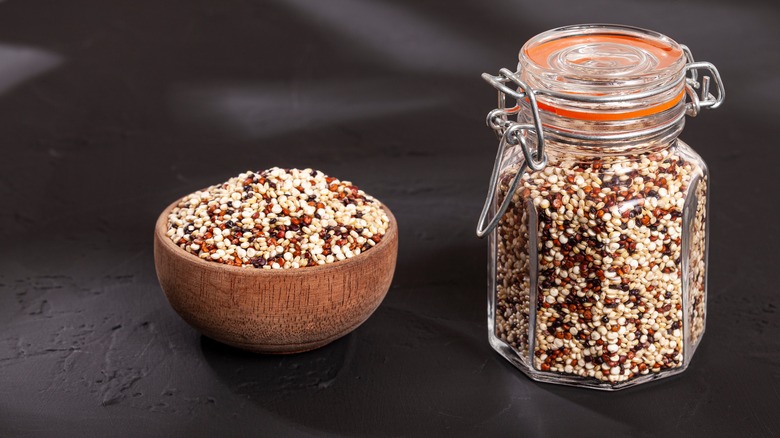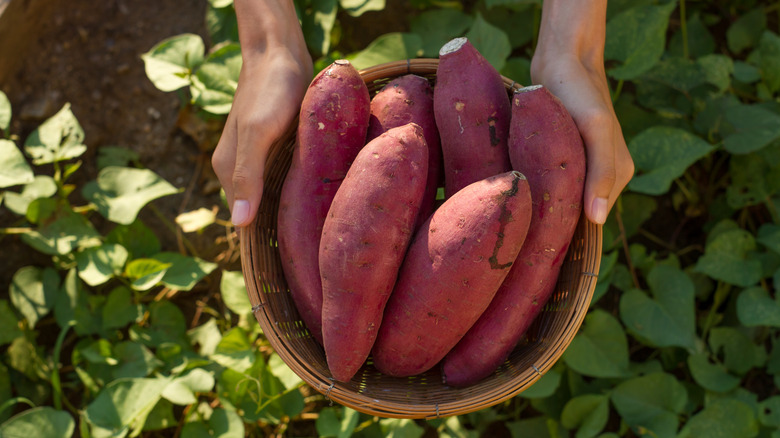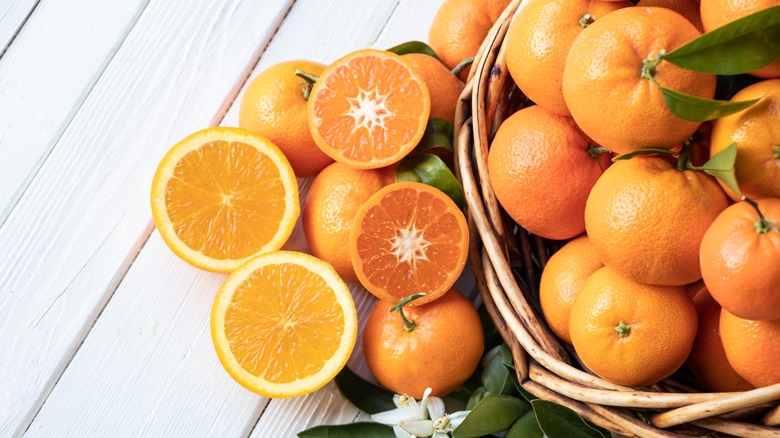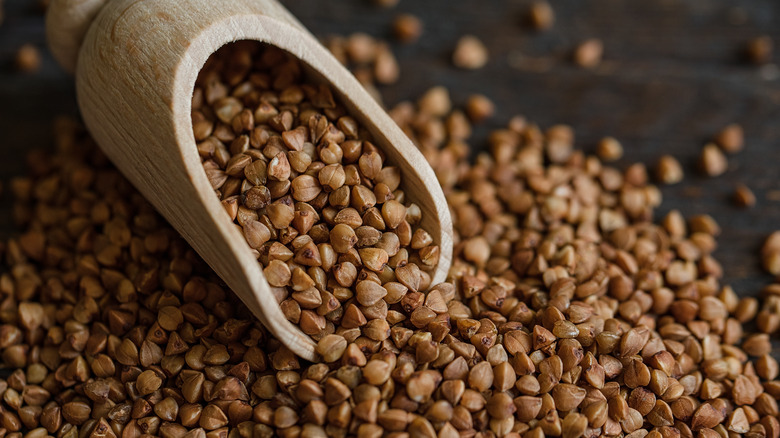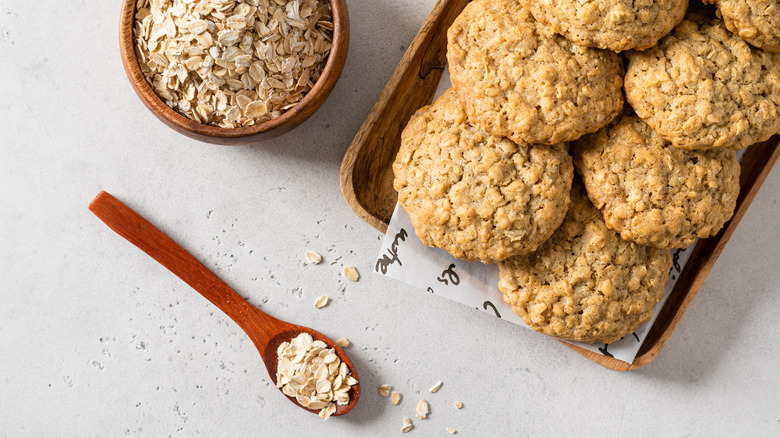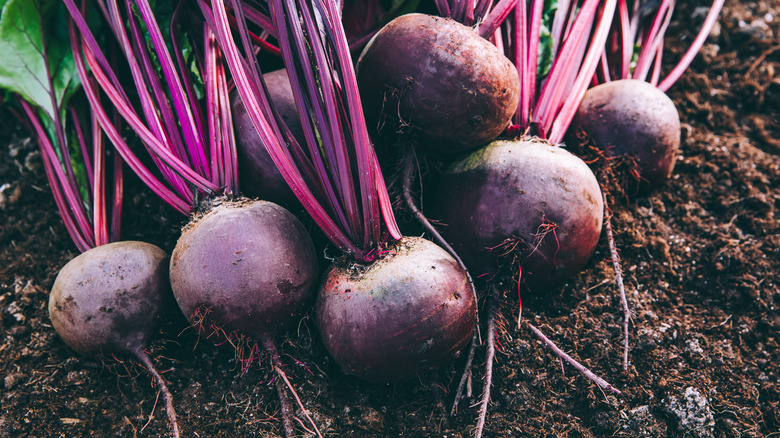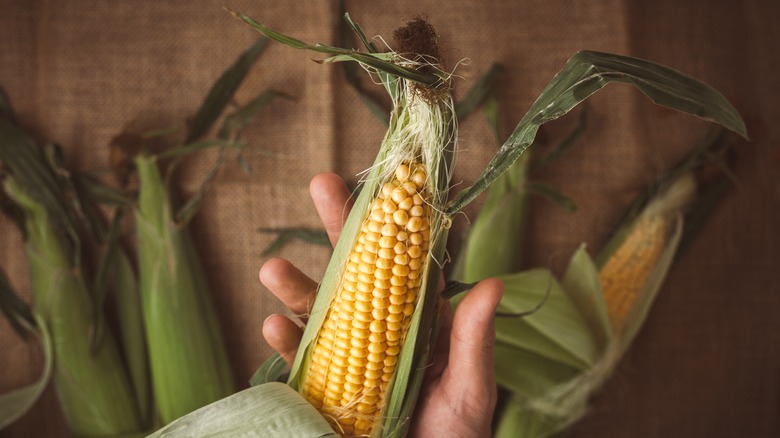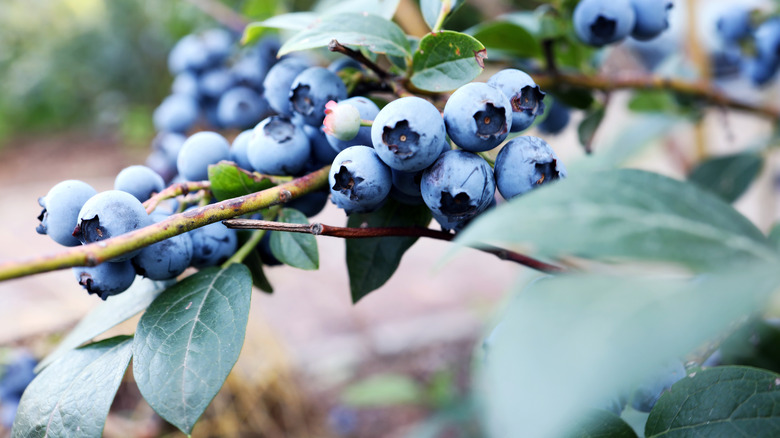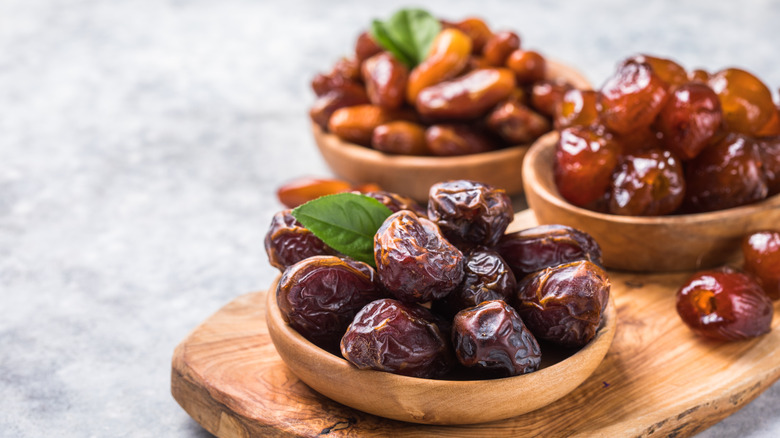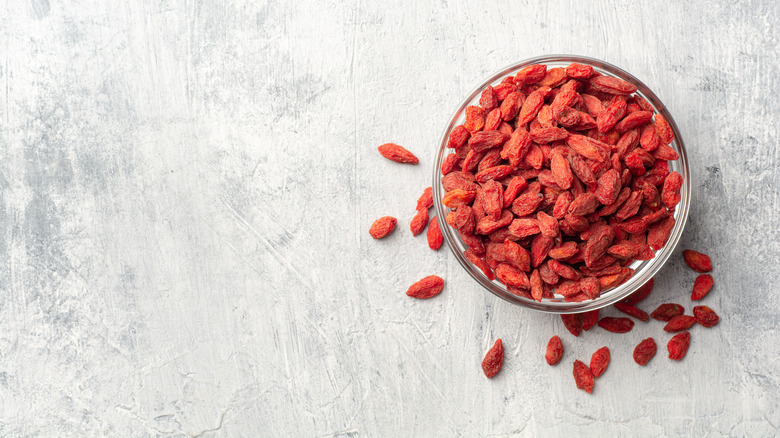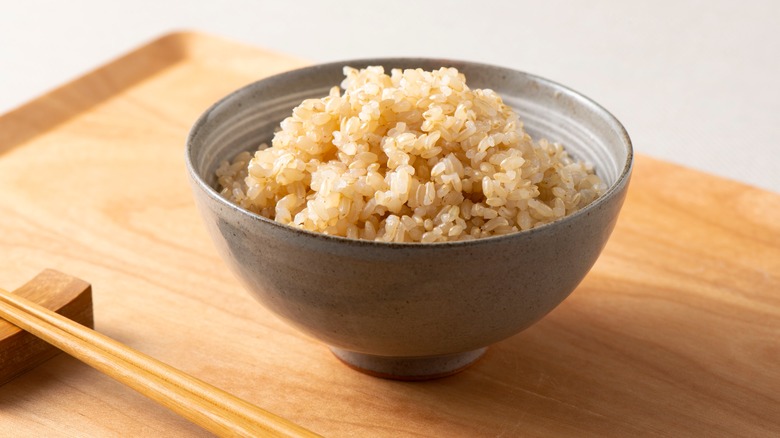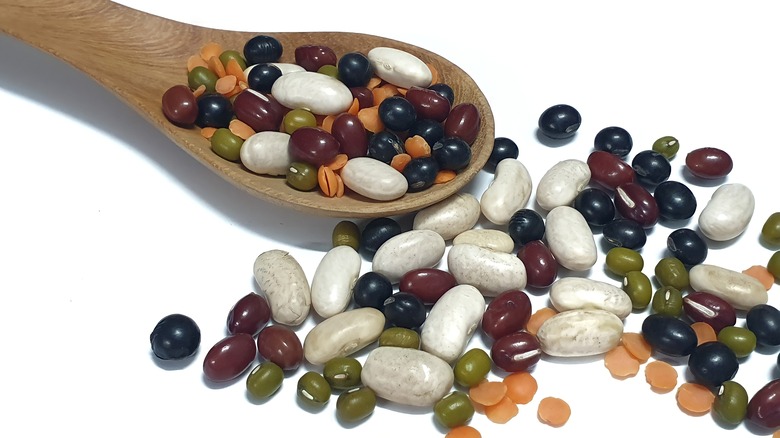The Healthiest Sources Of Carbohydrates You Can Eat
Carbohydrates have a confusing reputation. On the one hand, we all know fruits and vegetables to be nutritional powerhouses. But the rhetoric surrounding low-carb diets (Atkins, ketogenic diet, etc.) is enough to make you second-guess your consumption of even the most innocuous carbohydrates — like sweet potatoes, for instance. As you endeavor to clean up your diet, it can be tempting to jump on the low-carb bandwagon. Yes, we said, "bandwagon," and yes, we very much mean bandwagon.
Your body does not need carbs in the form of French fries, donuts, licorice, pretzels, or whatever other junk food really gets you going — but your body does need healthy carbohydrates to function optimally on a cellular level. Omitting carbs from your diet is an unsustainable way to shed pounds. Rest assured: Carbohydrates have their place in a healthy, well-rounded diet. If you're looking to drop pounds, eat cleaner, or just feel your best, you can swap out the uber-refined carbs (think: baked goods) for healthier carbohydrate sources (via WebMD).
While not all carbs are created equal, here are some of the healthiest sources of carbohydrates that you can feel good about eating.
Bananas
We aren't exactly sure where the idea that bananas are bad for you originated, but we are here to set the record straight. Bananas are not going to make you fat. Conversely, skipping out on eating bananas is likely not going to be the key to your body-related success either. Bananas actually contain different compounds that can aid in weight loss and promote health, which is quite the opposite of the nonsense that every banana-hater spews.
To be fair, bananas contain virtually no fat and only 1 gram of protein, meaning they are comprised of a balance between carbohydrates and water. Though there is variation when it comes to banana sizes, on average a banana contains around 110 calories and 29 grams of easy-to-access carbohydrates. They also contain a significant amount of vitamin C, potassium, niacin, copper, magnesium, folate, and riboflavin. Bananas contain a lot of fiber, which is thought to help regulate blood sugar, aid in weight management and digestion (via Healthline).
No one really talks about the fact that bananas are conveniently packaged and super easy to eat while just going about your busy, daily life, but we think that their individualized wrapping is a plus when it comes to bananas.
Quinoa
Oh, the magic of quinoa! Quinoa is technically a carbohydrate-containing seed, which is partly why it is such an awesome, nutrient-dense stand-in for more popular carbs like pasta or rice. Quinoa is predominantly made up of carbohydrates (about 70%) but it also contains a good amount of protein, vitamins, and minerals.
One prepared cup of quinoa contains around 222 calories, 39 grams of carbs, around 4 grams of fat, and 8 grams of protein. Looking deeper though, that same size serving contains about 5 grams of fiber, which is super good for digestion and satiety, iron, zinc, potassium, magnesium, and a ton of other vitamins (per Healthline). The vitamins and minerals in quinoa pack a powerful health punch, but the protein and fiber content add to quinoa's weight-managing prowess. Protein and fiber have both been known to help with satiety for longer after you eat, which can help placate the desire to reach for gummy bears in the afternoon (via Healthline). If you are looking to add in a carb source that offers auxiliary protein, quinoa is an excellent choice.
Sweet potatoes
In general, potatoes have a questionable reputation at best. Sweet potatoes, though they seamlessly morph into fries, chips, and more with a bit of oil much like their paler counterparts, are thought to be healthier — though they still carry the stigma that surrounds "processed carbs." To be clear, sweet potatoes taste delicious when fried in copious amounts of oil, but this is not when their nutritional profile shines.
Sweet potatoes are a healthy carbohydrate source, to be sure. They somehow manage to house myriad vitamins and minerals, while packing less than 20 grams of carbs in per 124-gram serving (this is roughly a cup of sweet potatoes, per My Fitness Pal). Sweet potatoes contain fiber, which we know to be super valuable and increases the healthiness rankings of most carbs. Beyond that, sweet potatoes contain iron, calcium, magnesium, vitamins, and numerous other trace minerals.
Sweet potatoes are thought to improve insulin sensitivity in people who have diabetes, while also helping others maintain their blood pressure, and find consistent GI movement. Their antioxidant profiles are known to help fight free radicals and boost immunity, while the kick of vitamin A can help protect the health of your eyeballs (via Medical News Today).
Citrus fruits
We probably don't need to give you another reason to cut open a delicious Cara Cara orange right now, but if you were awaiting a sign from the universe, consider this it. Beyond just providing your body with ample vitamin C, citrus fruits are a great way to provide your cells with the carbs they crave — and in a healthy way. Vitamin C helps bolster your immune system, while also helping to build collagen, which keeps your skin looking plump and healthy. Citrus fruits contain more than just vitamin C, though. They also provide your body with B vitamins, phosphorus, potassium, copper, and magnesium, all of which play important and differing roles within your physiology (via Healthline).
One cup of orange segments contains around 5 grams of fiber. Much of this fiber is soluble, as opposed to insoluble, which is prime time for helping lower elevated bad cholesterol levels. Citrus fruits may also help reduce your risk of developing kidney stones, cancers, heart disease, and brain inflammation, according to Healthline.
Buckwheat
Don't let the name fool you, buckwheat doesn't have anything to do with the glutenous wheat that is the foundation for most processed carbohydrate sources. Much like quinoa, buckwheat falls under the umbrella term "pseudocereal," meaning that it is technically a seed that is most commonly prepared as if it was a grain. Because it is a seed, it's nutritional makeup is different than those of most grains. And again, much like quinoa, this means that buckwheat takes the (highly refined, flour-filled) cake when it comes to its nutrient load.
Cooked buckwheat contains significantly fewer carbohydrates than raw buckwheat. Buckwheat is full of minerals, vitamins, and antioxidants, while also being a great source of protein and, you guessed it, fiber! Many studies have emerged showing that buckwheat consumption might have a beneficial effect on blood sugar regulation and heart health (via Healthline).
Oats
Until now, we have mostly spoken about pseudocereals and our propensity to sub them in place of more traditionally carb-y grains. When it come to oats, you kind of get the best of both worlds (insert Hannah Montana joke here). Oats are technically a grain, but they offer a boatload more nutrition than carbs like white rice or pasta.
While a one-cup serving of raw oats will run you over 50 grams of carbs, it also delivers about 8 grams of fiber, much of which is a special kind of fiber called beta glucan. Beta glucan has been shown to positively affect your cholesterol levels, blood sugar regulation, and immune system support (per Verywell Health). Oats have been particularly helpful when it comes to helping control blood sugar levels in people who have diabetes.
Since oats tend to keep you feeling full, they are a healthy grain to keep in your dietary rotation if you are working to manage your weight (via Healthline).
Beets
While you might be surprised to see a root vegetable on a list of healthy carbs to incorporate into your diet, beets have earned their spot on this list fair and square. A 100-gram serving of beets is only around 10% carbohydrates. But that relatively small amount of carbs packs a pretty fierce load of nutrients. Of the carbs housed in beets, nearly all of them are made up of fiber and sugars. Choosing to munch on beets will provide your body with the clean, healthy carbs it needs with a side of superfood powers.
Beets contain antioxidants, which help to rectify some of the damage done by free radicals within your body. They also contain a compound that is capable of lowering your blood pressure and potentially decreasing your risk of developing some diseases. Beets can also help your blood vessels relax, which allows oxygen to move through your body with greater ease when you exercise (via Healthline).
Corn
Of course, everyone loves popcorn during a movie, but if you're anything like us, eating corn — especially as a healthy source of carbs — hardly ever crosses your mind. Sure, there are a ton of other food products made of corn, but many of them seem highly suspicious. Are they good for you or are they just a starchy carb that you should avoid? It turns out that you might have been underestimating the healthy power of corn because it is actually super good for you (via Health).
While corn is often viewed as a vegetable, it is technically a grain and a member of a group of foods that are considered to be health-protective. Despite what diet culture has led you to believe, corn has been linked to lowered levels of obesity, in addition to the other diseases it can help lower your risk from. When compared to other grains, corn contains a lot more vitamin A and antioxidants (per Health). It also contains plentiful B vitamins and potassium, all of which support the health of your body in varied and necessary ways.
Blueberries
You have probably already heard that blueberries are one of the healthiest and most nutrient-dense foods you can eat. One cup of fresh blueberries is comprised of around 85% water and provides your body with about 15 grams of carbohydrates. The same size serving provides 4 grams of fiber, which is always an important factor when it comes to assessing the healthfulness of a carbohydrate source (via Healthline).
Blueberries also provide an epic amount of antioxidants, which can help benefit your body from the inside out. Beyond these basics, blueberries contain vitamin C, manganese, and vitamin K. Blueberries contain special compounds that can help protect the integrity of your blood cholesterol, some compounds may positively affect your blood pressure, and even aid in cognition. They are thought to help prevent heart disease, diabetes, urinary tract infections, and help your muscles repair themselves after grueling workouts, according to Healthline. If you are in the mood to eat a carb that is going to benefit your health across the board, reach for the bluest bluebs you can find and go to town. Yum!
Apples
Much like bananas, apples are known to be a healthy snack. But since so much of what you unintentionally hear about "dieting" revolves around carbohydrates being the enemy, it can be easy to wonder how "healthy" such a carbohydrate-laden food could actually be. Apples are not quite as stacked with vitamins and minerals when put in a head-to-head competition with more nutrient-dense fruits like blueberries or pomegranates. But when it comes to being a fiber-heavy carbohydrate source, apples are a pretty killer choice, according to the accolades outlined by Healthline.
Don't be misled here though — apples DO contain vitamin C and antioxidants, just slightly less per 100-gram serving by comparison. This size serving of apple will provide your body with around 15 grams of carbs. Getting down with apples on the reg may help your body regulate its blood sugar, aid in heart health, and, when consumed daily, are thought to decrease your risk of developing certain cancers, according to Healthline.
Dates
Valentine's Day jokes aside, what could be sweeter than enjoying a date or two all year round? Not much, really, as dates are about as sweet as it gets when it comes to healthy carbs that you can enjoy. Dates are the fruit of palm trees and when you find them in the grocery stores in the United States, they are usually dried. A 3.5-ounce serving contains 75 grams of carbs and 7 grams of fiber. This size serving contains more than 270 calories, which seems like a lot for a fairly small serving of dried fruit. However, with this great caloric density comes a good deal of nutritional gusto, which makes these bad boys a super healthy snack to add into your diet.
Dates contain antioxidants, which we also love. They also have a small amount of protein per serving, as well as potassium, copper, magnesium, manganese, and vitamin B6. Most curiously, a serving of dates contains around 5% of the recommended daily intake amount of iron (via Healthline). Dates are thought to promote brain health, labor, and bone health. Talk about a sweet treat with some stellar benefits.
Goji berries
Maybe you've heard of goji berries, maybe you haven't. Goji berries are native to Asia and are most often found in health food stores in the United States. They have a ton of potential health benefits and a sweet flavor that makes them feel like a second cousin to raisins, but in a more delicious way. A 1-ounce serving of goji berries contains around 100 calories, 4 grams of protein and virtually no fat. That same size serving contains about 22 grams of carbohydrates and more than 3 grams of fiber. They also contain over 10% of the daily recommended intake amount of iron in addition to packing a big ol' vitamin C punch (via The Healthy).
Goji berries also have an abundance of antioxidants and are thought to have other huge health benefits. These benefits include immune support, cancer-fighting abilities, and blood sugar stabilization. Some research suggests that goji berries and goji berry juice can help alleviate some of the symptoms of anxiety and depression while also promoting better sleep. These little red berries might even help prevent liver damage, which is another amazing bonus when it comes to adding goji berries as a carb source in your life (via Medical News Today).
Brown rice
Rice is one of the most ubiquitous carbohydrate sources. While white rice has its own benefits, it pales in comparison to the health benefits that brown rice can provide. Brown rice is an awesome carb to add into your diet because it also contains some fiber. A half-cup serving of brown rice provides your body with 2 grams of fiber, 3 grams of protein, and 1 gram of fat. You'll also be receiving 22 grams of carbs for your body to use on a cellular level.
Brown rice has an earthier flavor because it is not processed and stripped of the bran and germ, which is how white rice has come to be. In the germ and bran is a treasure trove of nutrients that your body craves. Brown rice contains B vitamins, calcium, iron, phosphorus, selenium, magnesium, and manganese. Brown rice also contains antioxidants, which can help your cells stay healthy and young (via WebMD).
Beans
Beans and legumes are another healthy source of carbs worth adding into your diet. In general, a serving of beans will provide your body with 20 to 30 grams of carbs, though this number varies depending on what kind of beans you choose to consume. As you're probably aware, beans contain a pretty hefty shot of fiber, which is why they have a reputation for causing epic flatulence.
Kidney beans, specifically, have been linked to a lowered risk of colon cancer and an improved ability to regulate your blood sugar. They also contain some protein, as well as other compounds that can benefit your body in super healthy ways. Garbanzo beans are touted for their ability to improve heart and digestive health, while also providing good amounts of phosphorus and B vitamins. Though more research is needed, they are even thought to help reduce the risk of certain cancers as well (via Healthline).

